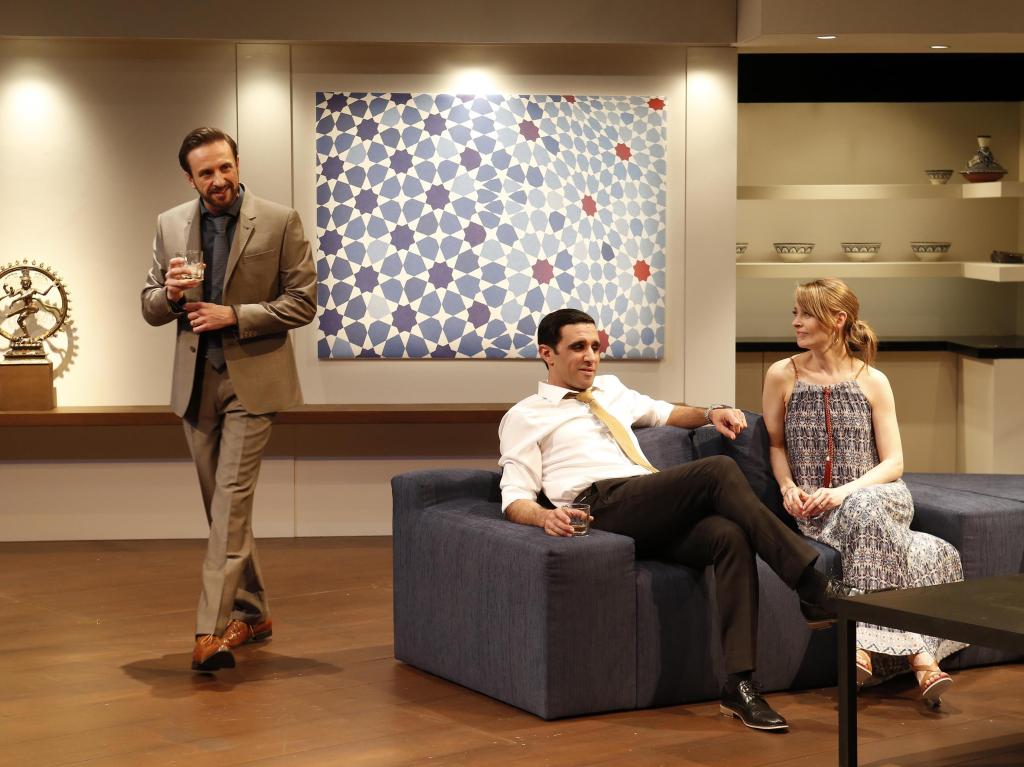Mitchell Butel, Hazem Shammas, Kat Stewart in Disgraced. Photograph by Jeff Busby.
Ayad Akhtar’s Disgraced is a Pulitzer Prize winning contemporary drama that has been staged on Broadway, in London and had it’s Australian premier a few months ago at the Sydney Theatre Company. This controversial play offers an explosive exploration of race, religion and identity and all breathtakingly done in one act, four scenes and ninety minutes. Make no mistake, Disgraced will divide audiences and spark fierce debate.
Amir Kapoor (Hazem Shammas) is a lawyer working in mergers and acquisitions who lives in a beautiful modern apartment on the Upper East Side in New York with his artist wife Emily (Kat Stewart). During the opening scene we learn that Emily’s latest works are influenced by traditional Islamic art and this unsettles her husband who is of Pakistani heritage and was raised in a strict Muslim household. Amir has aggressively abandoned his religious upbringing and has even gone so far as to change his name and conceal his ancestry in order to further his career. After a newspaper article is published that could jeopardise Amir’s position at his law firm, long held tensions and destructive internal demons begin to surface.
The narrative threads collide with devastating consequences at a dinner party with Amir’s work colleague Jory (Zindzi Okenyo) and her husband Isaac (Mitchell Butel) who is also Emily’s art dealer. In one extremely dense and extraordinarily well written scene. Politics and religion are discussed, accusations are made, names are called and secrets are laid bare. After this night no one will ever be the same and in one sickening act of violence Amir transforms into everything he has always hated.
Disgraced is not for the faint of heart. It is unflinchingly confronting, contains some gasp-inducing language (literally) and forces the audience to face some difficult realities about our post 9/11 socio-political climate.
Nadia Tass directs this challenging piece of theatre with gusto and tackles the uncomfortable themes head on. She demands that the audience witness the events without looking away no matter how distressing they become; it’s riveting stuff. She also conjures some beautiful images, such as when Amir throws a glass off the top of the second story balcony in a fit of rage or when he stands beside a portrait of himself painted by Emily at the conclusion of the play. It’s a haunting final tableau that creates a horrifying stillness, is ripe with irony and shows the irrevocable damage Amir has brought upon himself and those he supposedly loves.
Tass brings out the best in her fantastic cast. Stewart radiates warmth and intelligence as Emily. She is a complicated character who loves Amir but can ultimately never help him battle the war within himself. Butel and Okenyo offer some much needed comic relief and they deliver some of Akhtar’s best one-liners with perfect comic timing. When the argument begins to heat up both performers rise to the challenge and handle the twists and turns of the plot brilliantly allowing their multifaceted characters to shine through. Kane Felsinger makes an admirable main stage debut as Amir’s troubled young cousin Abe, instilling a palpable sense of frustration and burgeoning rage in his portrayal.
Shammas has an almost insurmountable task in taking on the central role of Amir. He is so highly strung from the very beginning and speaks and behaves in such an abhorrent manner at times that it becomes increasingly difficult to sympathise with him. Shammas has a powerful physical presence on stage and offers small glimpses into Amir’s inner struggle, but ultimately he doesn’t quite succeed in creating a fully realised character.
Shaun Gurton’s set design is perfect. He has created the illusion of a fully functioning double story New York loft apartment complete with an illuminated city skyline and expensive furnishings. The use of music within the sound design is less successful as it becomes increasingly unsubtle by blatantly signposting dramatic events. This is unnecessary and deflates the tension being created on stage.
Disgraced is already a runaway success for MTC; the season practically sold out months before it opened and it’s exciting that so many people will get to see this fantastic production. This is a bold, provocative and shocking piece that uses the structure of the traditional American play to confront some of the most complex and crucial issues in our world today. This is theatre with no easy answers. This is theatre that demands you to ask questions and will stay with you long after the lights go down.
Rating: 4.5 stars out of 5
Disgraced by Ayad Akhtar
Directed by Nadia Tass
Set Design by Shaun Gurton
Costume Design by Jill Johanson
Lighting Design by Nigel Levings
Composition & Sound Design by Russell Goldsmith & Daniel Nixon
Featuring Mitchell Butel, Kane Felsinger, Zindzi Okenyo, Hazem Shammas and Kat Stewart
The Fairfax at Arts Centre Melbourne
19 August – 1 October 2016





